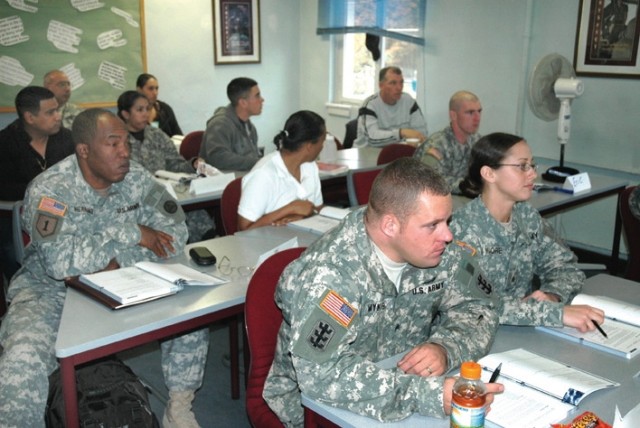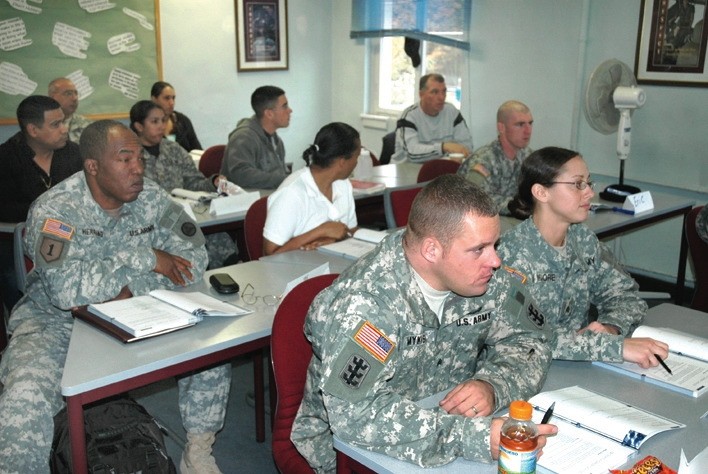HANAU, Germany (Army News Service, Dec. 5, 2006) - Making a career change can be one of life's major challenges - particularly when it involves leaving the military to seek employment in the civilian sector.
Thanks to the Army's Career and Alumni Program, Soldiers have a wealth of resources from which to draw support, advice and instruction on how to prepare and conduct a successful job search.
"We're here to alleviate any anxieties people may have about transitioning out of the service," said Sharon Brannon, ACAP contract installation manager for Hanau, Giessen and Wiesbaden. "We're here to help them in their transition needs."
"I absolutely encourage people to get started as early as possible," said Leslie Stancoven, ACAP contract installation manager for Baumholder and Kaiserslautern.
Soldiers planning on retiring from military service are advised to start as early as two years in advance of the actual military retirement date, while those leaving the military before retirement should begin a year in advance, ACAP officials said. "Sometimes people are surprised that they can start a year early for an ETS or two years early in the case of retirement," said Stancoven.
During Transition Assistance Program workshops and other ACAP classes, Soldiers learn how to sell themselves in a resume, write cover letters, prepare for job interviews, ways to cash in on their military benefits and a host of related skills.
"We assist people in obtaining the skills needed to find a job in both the private and the federal sectors," said Stancoven.
After undergoing pre-separation training and a job search workshop, ACAP participants learn how to write a resume that truly reflects all of the skills they've accumulated during their military service and before, and gain access to ACAP's wide-ranging online employment resources.
"The first thing we do is ensure that they know about the benefits and services available," said Brannon. "We're a support agency for the Department of Labor."
In addition to training provided by the ACAP counselors - all of whom are required to have a master's degree in career counseling or a related field - members of the Department of Veterans Affairs provide detailed descriptions of the benefits provided to military veterans after they leave the service.
"They do an excellent job of telling them about the resources and benefits available to veterans," said Brannon, adding that VA officials can also address any medical benefits issues Soldiers may have concerning injuries or illnesses suffered while serving their country. "Members of the VA are here 10 months out of the year."
"The earlier they get started, the better," said Brannon. "They might have a Plan A, but whatever plans they have, by starting early, they'll have enough time to get everything in place. That's the tragedy we see - when they come in with only six months left in the service and don't have enough time to realize their dream."
"It's been a pretty good program," said Spc. Ryan Carney of Troop A, 1st Squadron, 1st Cavalry Regiment. "I started the program about six to eight months before my ETS. "It's made me realize what I need to do when I get out.
"A lot of Army programs aren't that good, but this one is one of the better ones," said Carney. "It's a lot more useful than I thought it would be."
"I heard through word of mouth and my unit that it would be a good program," said Spc. Jeffery Underwood of Headquarters and Headquarters Troop, 1-1st Cav. "It's helping me in my transition from the military to the civilian world. It's been a really useful program."
Both Soldiers stressed that starting early in ACAP is crucial. "Also, pay attention during the classes - especially on how to write a resume and use the job search information," said Underwood.
"We encourage people to have long-term and short-term goals," said Stancoven, explaining that for those who treat the job search process like a full-time job - putting in the time to write a professional resume and fully researching job options on the Internet and through other channels - the end result is usually obtaining the goal. "People need to be open-minded about the job search process and how their skills will translate into a civilian job."
But Soldiers also shouldn't sell themselves short, she said, adding that employers appreciate the Army work ethic, professionalism and the variety of skills learned while in the military.
Family members are also encouraged to join their spouses in learning about ACAP's services and Army benefits, said Brannon. "We're not just for Soldiers. Family members are welcome to come in and get a jumpstart," particularly in cases where the Soldier may be downrange and not able to get a timely start on the transitional job search.
Before coming into ACAP Soldiers and family members should have an Army Knowledge Online account to use ACAP's computers and online tools. "Everything is electronically based now," said Brannon. Soldiers can also access their Verification of Military Experience and Training online when preparing their ACAP packets.
ACAP counselors can also take training out to the units, she said. "When there are large blocks of Soldiers transitioning out, we have no problem going out to the units."
For more information on the Army Career and Alumni Program, visit your local ACAP office.
(Karl Weisel writes for U.S. Army Garrison Hessen Public Affairs.)


Social Sharing